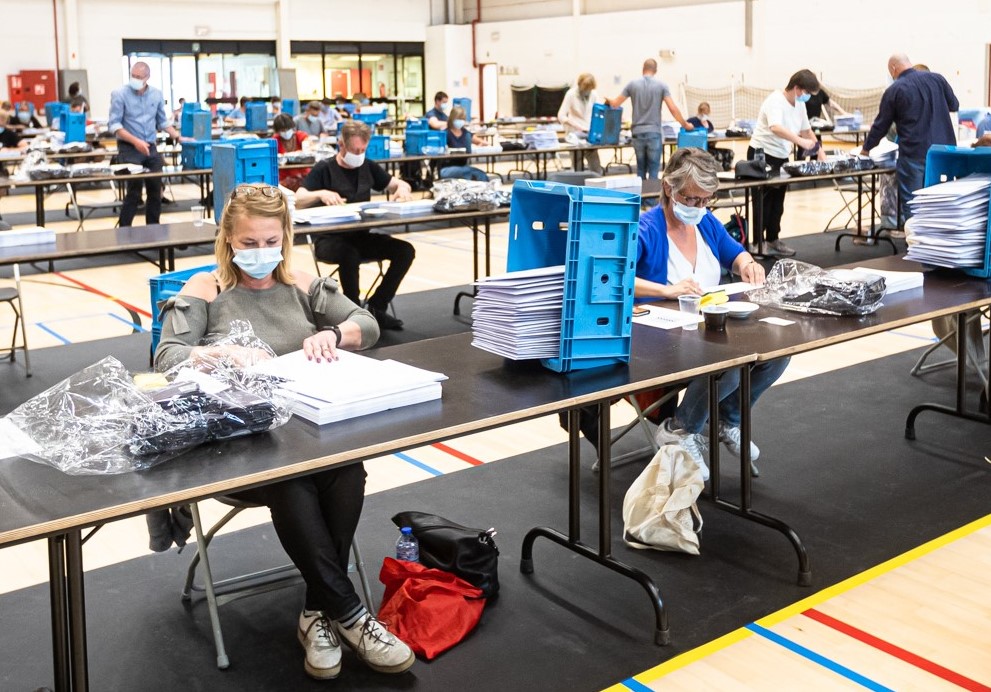
When I was asked if I wanted to write an article for this issue of PM magazine, I felt honoured. I’m honored to share with you how local governments in Flanders, Belgium, have managed the COVID-19 pandemic locally and how we are preparing for the next crisis, what lessons we have learned, and what good practices we have introduced.
I’m used to looking at things from a local perspective. I did so in 2004, when I began my civil service career as a personnel manager for the city of Roeselare, and I still do so today in my duties as city manager for the city of Bruges.
I do not exaggerate when I say that the past year was not only the busiest of my career so far, but that it was also a year in which our organization and all its employees were pushed to their limits. But I am sure that this is a recognizable situation for all of you, wherever you work across the globe.
My organization has treated this crisis as an opportunity: an opportunity to be there for our clients—our citizens—when they need us most, and to be civil servants in the true sense of the term, at a time when there are more questions than answers. I wouldn’t dare go as far as to compare this period with “the darkest hour,” although I have to admit that as the grandson of a British Allied soldier, I was tempted. But it’s true that we have to go back to the Second World War to find a global challenge of the same magnitude.
At the local level, we needed and wanted to be ready. More than ever, we had to be the backbone of our city. Spoiler alert: we succeeded, and our success continues today in spite of our country having more levels of government than there are layers in a lasagna. But before I continue my story from this local perspective, I would like to tell you a bit more about Belgium’s system of government.
Levels of Government in Belgium
Belgium became independent in 1830. Between 1970 and 1993, the country evolved into a more efficient federal structure. This occurred through six state reforms (in 1970, 1980, 1988-89, 1993, 2001 and 2012-2014). As a result, the first article of the Belgian constitution reads today: “Belgium is a federal state, composed of communities and regions.”
The power to make decisions is no longer the exclusive preserve of the federal government and the federal parliament. The leadership of the country is now in the hands of various partners, who independently exercise their authority within their domains.
The Communities
The redistribution of power occurred along two lines. The first line relates to language and, in a broader sense, to everything related to culture. The result was several communities. The concept of community refers to persons that make up a community and the bond that unifies them, namely their language and culture. Belgium sits across the fault line that separates German and Latin cultures. This explains why the country has three official languages: Dutch, French, and German. As a result, Belgium today has three communities that correspond with the population groups: the Flemish Community, the French Community, and the German-speaking Community.
The Regions
The second line of state reform was historically inspired by economic interests. The regions, which aspired to more economic autonomy, conveyed these interests. The establishment of the three regions was the result: the Flemish Region, the Brussels Capital Region, and the Walloon Region. Up to a certain level they can be compared with the American states or the German Länder. The country is further divided into 10 provinces and 581 municipal councils.
The Federal State
The Federal State nevertheless retains important powers (for example, in the areas of foreign affairs, national defence, justice, finance, social security, important parts of national health, and domestic affairs. However, the communities and the regions also have the power to establish and maintain foreign relations.
The Federal Approach to COVID
In Belgium, management of the COVID-19 pandemic has been coordinated since its outbreak from the highest (i.e., the federal) level. You do not have to be a rocket scientist to figure out why things have gone wrong from the start; a basic knowledge of organization theory, communication, and marketing suffices. It’s very difficult to make clear decisions at the highest level of government and to effectively enforce them at the lowest level (i.e., to make sure that they are accepted). Achieving this requires a certain degree of involvement from the intermediate levels and from the lowest level, an understanding of the needs of the lowest level, and—last but not least—those of the client. And this is exactly where the federal approach of the COVID-19 crisis falls short. Although this situation is not new, the magnitude of this crisis and the need for quick and vigorous action have made it painfully clear. This conclusion, combined with the fact that the federal approach has remained unchanged since the start of the pandemic—even when it became apparent that mistakes had been made—clearly shows that the problem is ingrained and structural, and that fundamental change is necessary. Let me explain by means of two cases.
Face Masks
The first case is the acquisition and the distribution of face masks at the outbreak of the COVID-19 pandemic. The second is the vaccine rollout and the setting up of vaccination centres, a task that is far from complete, with about 50 percent of the work that should have been done by now actually done. It is obvious that the highest, federal level plays an important and exclusive role here, such as in buying face masks and vaccines on the world market. The painful conclusion for Belgium, however, was that this went far from smoothly. The federal administration not only appeared to be slow-moving, it was also far from faultless, nor was it a fast learner. The federal face mask acquisition process was so slow that local authorities decided to take action themselves, buying and distributing face masks at record speed. The face masks ordered by the federal government were distributed at a much later stage (too late, actually) through pharmacies, who in the end found themselves stuck with large unused stocks.
Vaccination Centres
After the whole situation with the face masks, history repeated itself with the vaccines. You could say that having the local administrations set up the vaccination centres was a much better plan. However, where we succeeded in setting up the centres in record time, the federal government failed to deliver a sufficient number of vaccines. The federal interference in the further rollout of the vaccines—and consequently also in the operation of the vaccination centres (in terms of communication, client/citizen invitations, etc.—was another example of bad practice.
Not only did it illustrate the federal government’s lack of confidence in the abilities of the local administrations, but the lack of solutions and lack of communication tailored to local needs also left these local administrations feeling utterly frustrated.
The Local Approach to COVID
But it’s no use crying over spilt milk and like Winston Churchill said, “Success is stumbling from failure to failure with no loss of enthusiasm.” If this crisis has made one thing clear, it is that local administrations have the ability to achieve great things. They stand closest to the citizens and have the best knowledge of the field. Local government is your best choice for an efficient and effective citizen-based approach.
In both cases I described, the outcome would have been better if the local authorities had been invited as full-fledged partners to the decision-making table from the start. The good intentions that are obviously present at every level of government would not only have been brought together, they would also have led to more efficient cooperation.
The future is local, and a local approach will help us tackle future crises. Local governments and civil servants have to be trusted with more power. Wars are not won from behind a desk; they are won on the battlefield.
During the pandemic, I started writing letters to the employees of the city of Bruges. This has become a habit now; one that gives both me and them courage. I would like to finish this article with an extract from one of these letters. It is my way of paying homage to all the civil servants in the world, as it is they who led us through this crisis:
We live from day to day. Insecure and worried. Worried for ourselves and for those who are dear to us. Despite these difficult circumstances, I see the efforts you all make, at home or in the field. I see you helping citizens at our front desk or over the phone. I see you guarding the entrances to our buildings for your colleagues working there and for our clients. I see you cycling in the streets and squares of Bruges, talking to the inhabitants. I see you emptying rubbish bins.
I see you, sitting on your knees, weeding the flowerbeds to keep them neat and tidy. I see you doing your jobs at the crematorium and preparing yourselves for a scenario we hope will never happen. I see you driving around to distribute bottles of hand sanitizer. I see you cleaning the same spot, doorhandle, or desk tirelessly over and over again. I see you sending emails and following up on them digitally or over the phone from your own homes.
I see you providing your colleagues with the necessary IT equipment and tools to work from home. I see you informing and reassuring citizens, as well as colleagues. I see you constantly ensuring the proper functioning of your teams. I see you swiftly and accurately handling the internal and external communication. I see you providing tailored solutions to never-before-seen problems at record speed. I see you helping out other teams. I see you.

COLIN BEHEYDT is city manager of Bruges, Belgium (Colin.Beheydt@brugge.be).
New, Reduced Membership Dues
A new, reduced dues rate is available for CAOs/ACAOs, along with additional discounts for those in smaller communities, has been implemented. Learn more and be sure to join or renew today!
